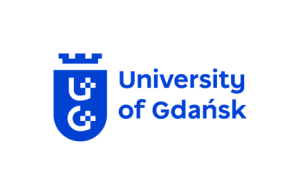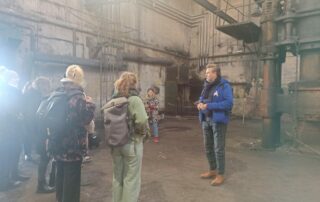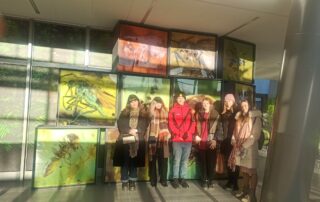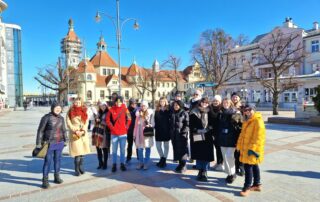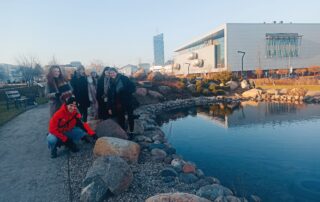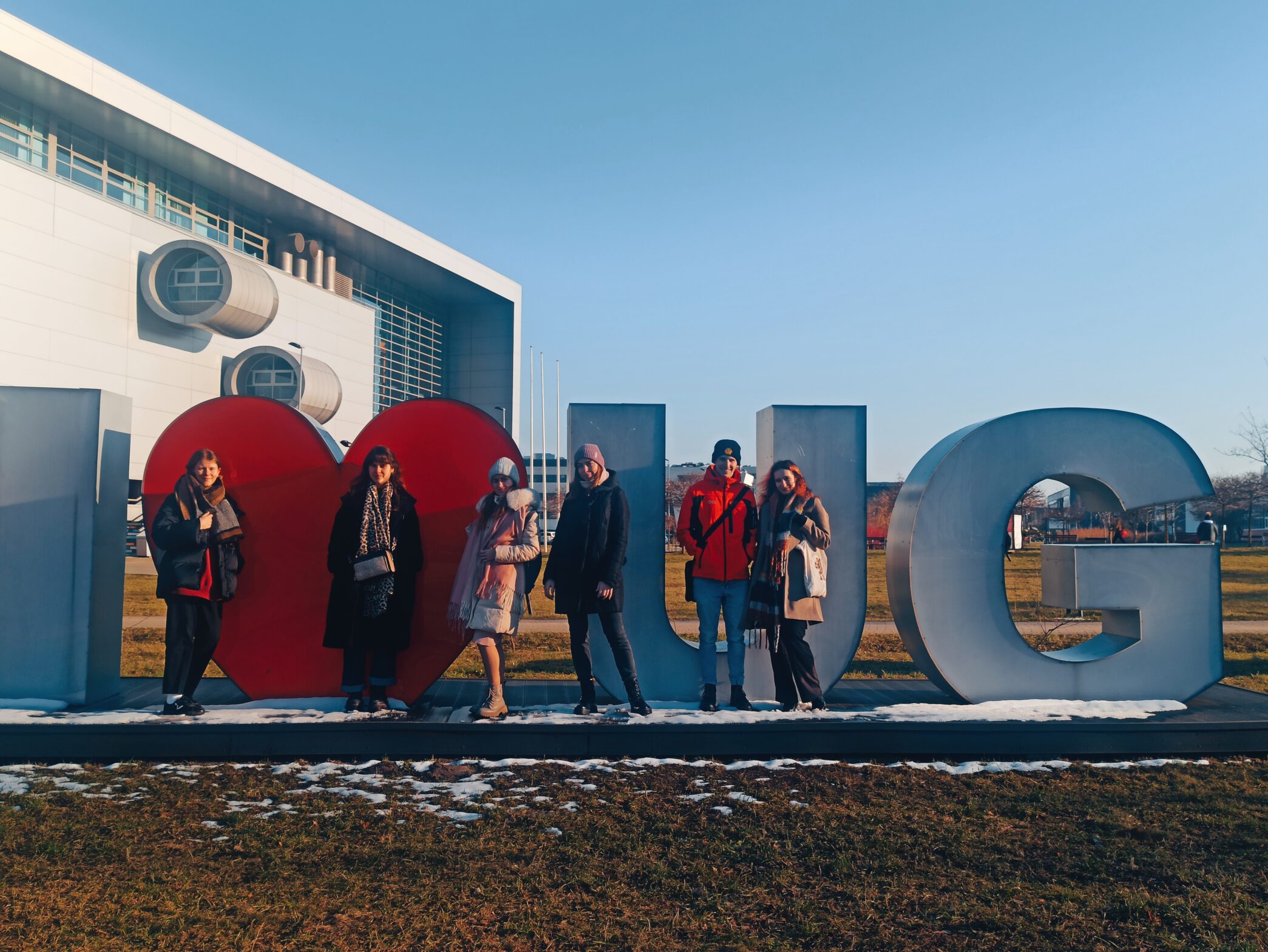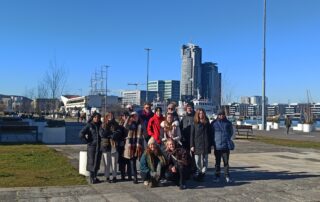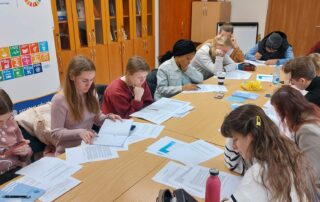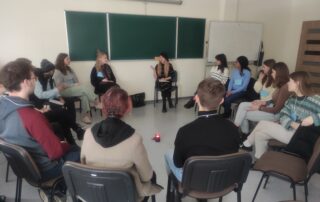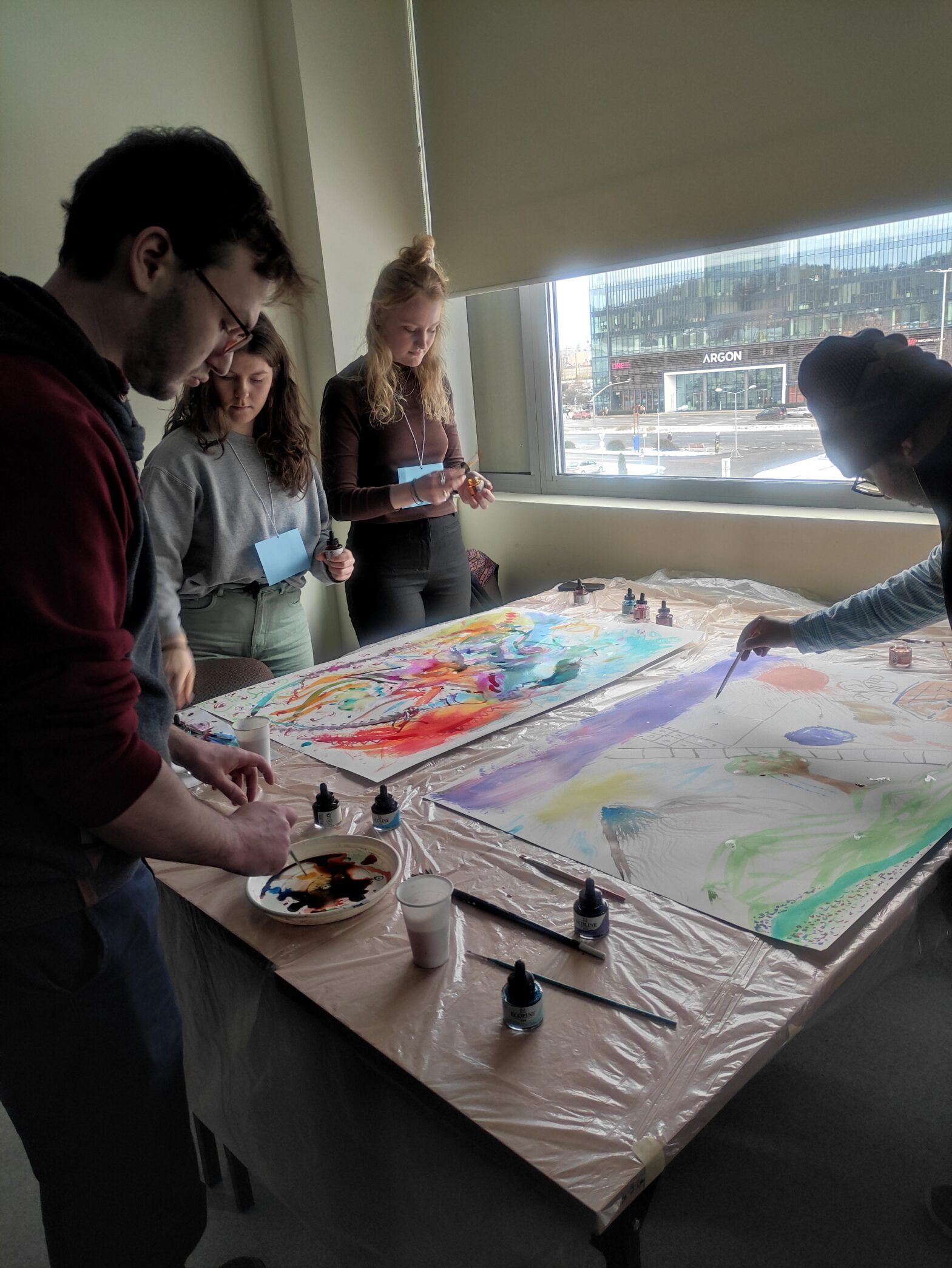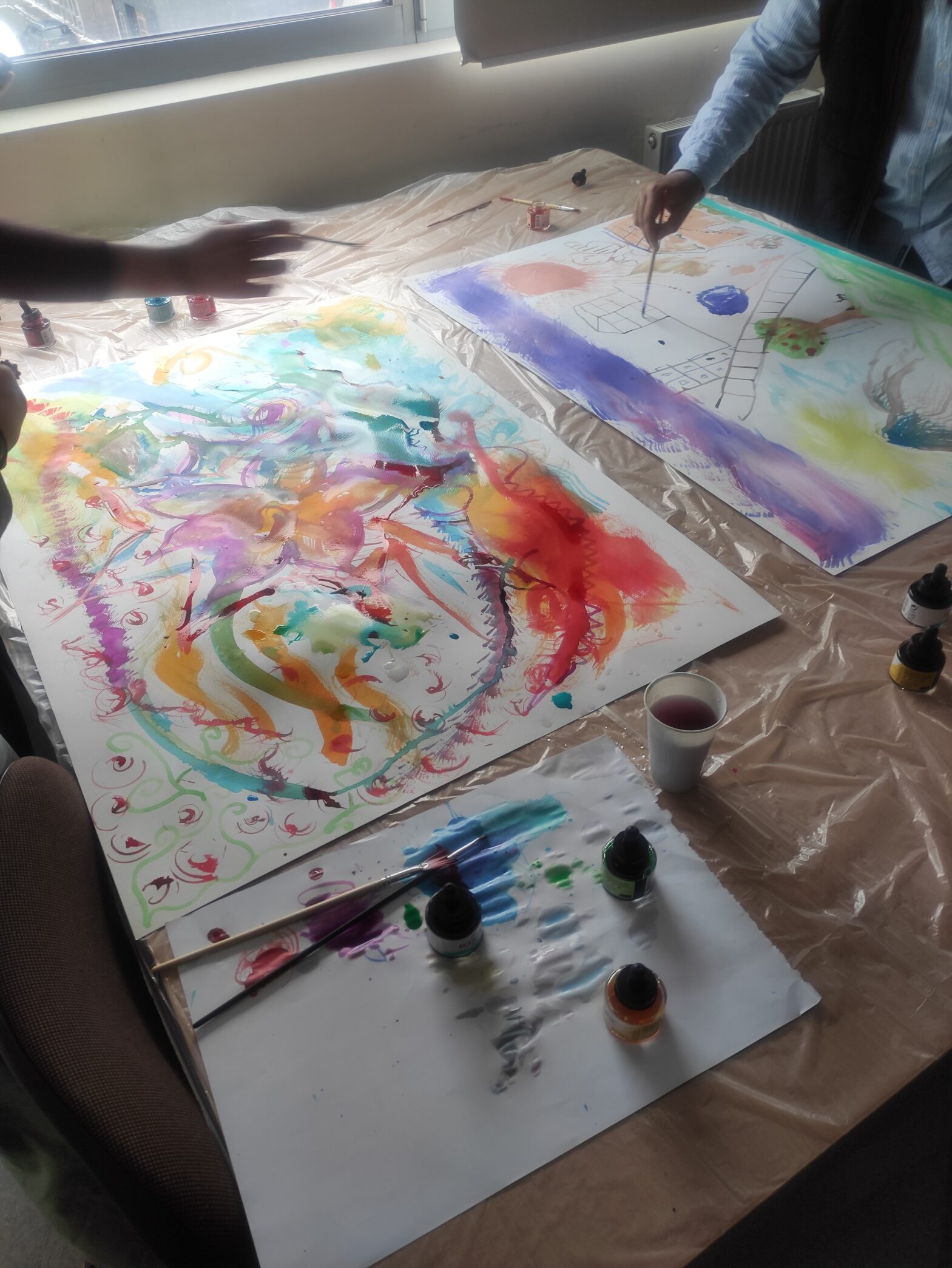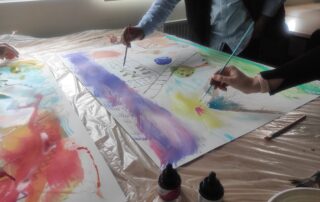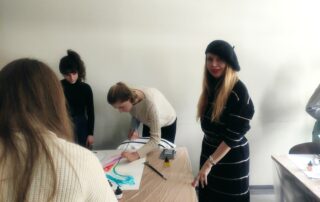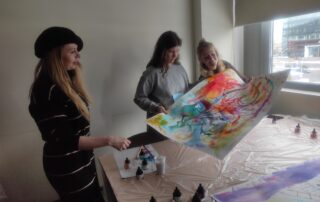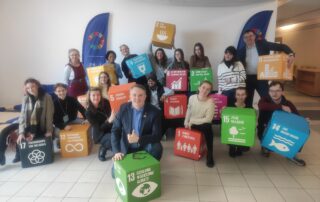
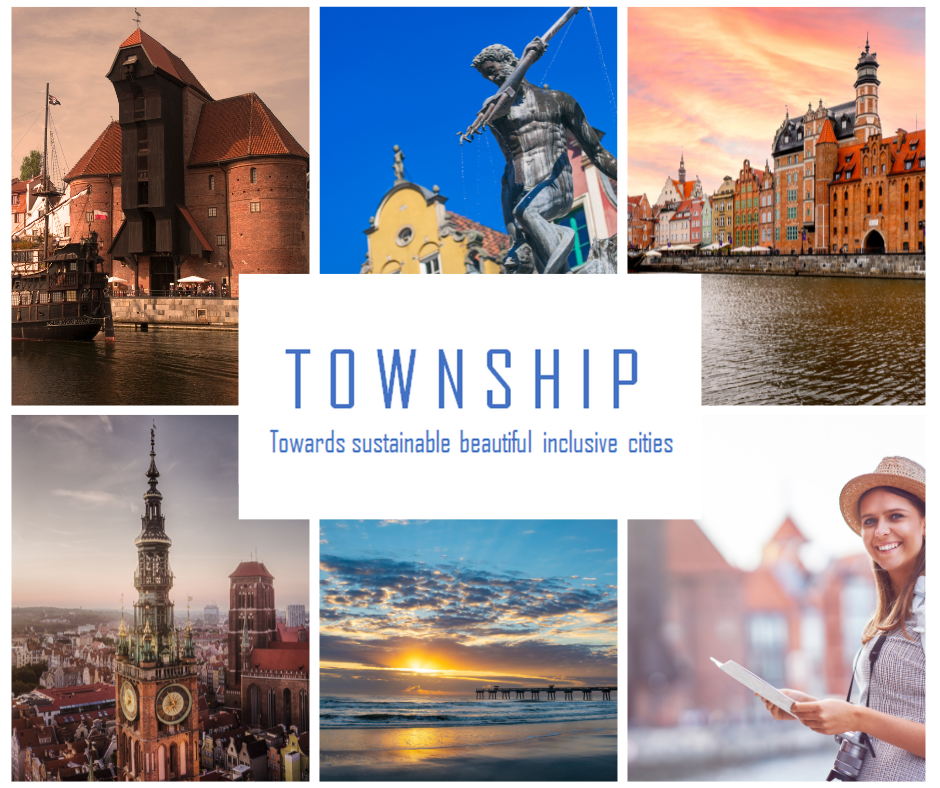
This summer!
Gain new knowledge and skill with the fantastic academic team from the University of Gdańsk.
Take a ride on our TOWNSHIP Towards Sustainable Beautiful and Inclusive Cities.
The size of the world’s population living in urban areas has exceeded 50%. Further estimations say that by 2050 the urban population is even 70% of all humanity. That means, for an increasing number of us cities are becoming our living environment. That is why cities’ condition, resilience, ability to adapt to ongoing changes, and increasingly difficult-to-predict environmental, social and economic phenomena directly affect our quality of life.
As citizens, we have a say in shaping our cities. However, for our decisions or choices to consciously lead to city shaping where living will be comfortable, pleasant, and safe, we must know both the problems and the tools to solve them.
See the winter school report and find out why it’s worth it!
The courses are funded by the NAWA SPINAKER program, grant agreement number:
BPI/SPI/2021/1/00016/U/DRAFT/00001

we offer you a quick immersion into the subject of urban problems, but we will not only talk about problems but above all about solving them. We will also create a space for you to propose your ideas on how to create cities that are more beautiful, more comfortable, and safer to live in.

we offer you a quick immersion into the subject of urban problems, but we will not only talk about problems but above all about solving them. We will also create a space for you to propose your ideas on how to create cities that are more beautiful, more comfortable, and safer to live in.
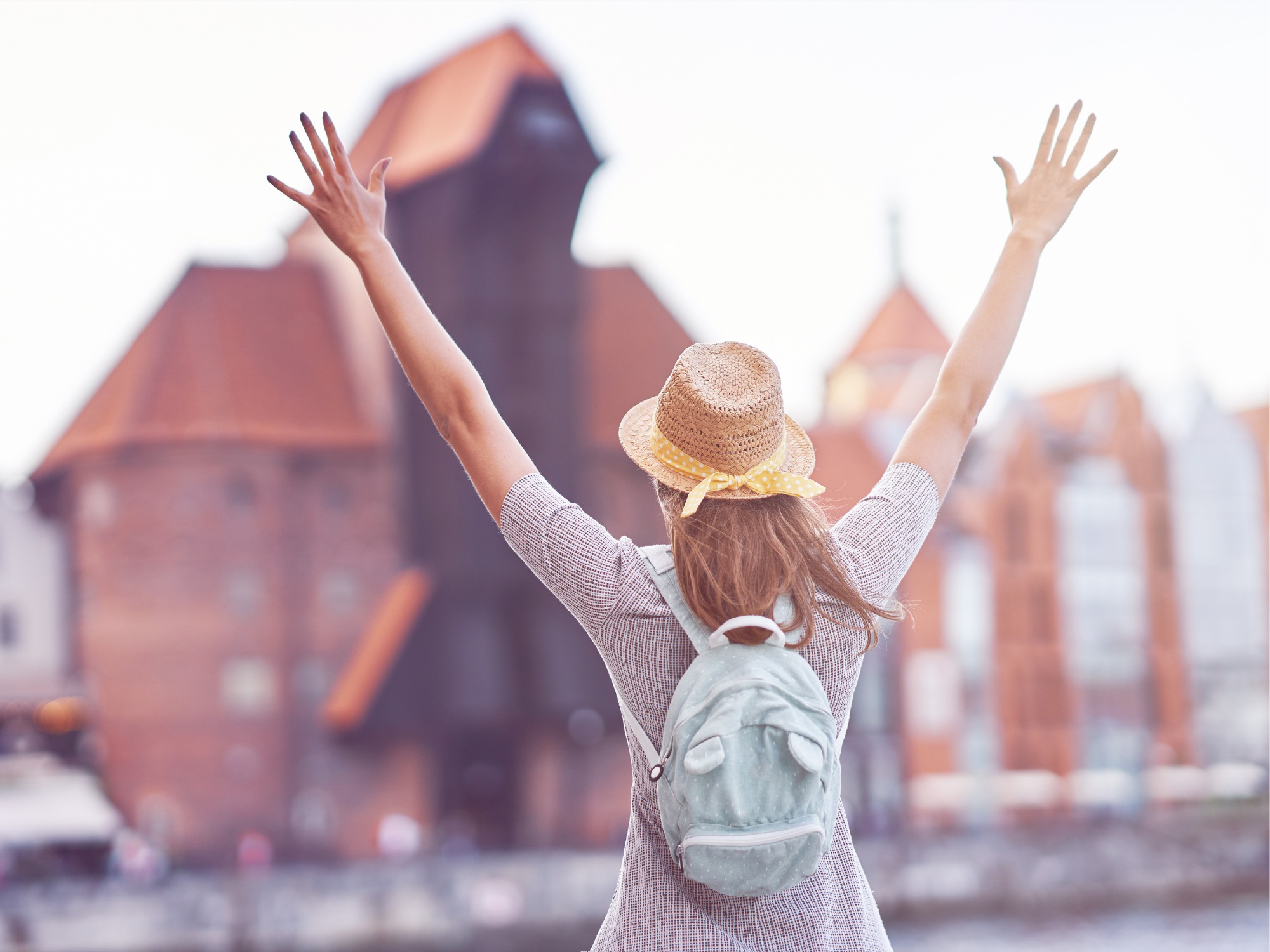
we offer you a quick immersion into the subject of urban problems, but we will not only talk about problems but above all about solving them.
MOOC (Massive Open On-line Course) TOOLS TOWARDS SUSTAINABLE URBANITY
The Faculty of Social Science at the University of Gdańsk offers an online course in English for students on the topic: TOOLS TOWARDS SUSTAINABLE URBANITY. We credit 2 ECTS points. Students can fulfill all the tasks in 2 weeks. The recruitment is now open.
For whom?
- We invite students from abroad with knowledge of English
- The order of application decides the qualification, with priority given to undergraduate students
- Regulamin rekrutacji i udziału w projekcie TOWNSHIP
- Rules of Recruitment and Participation TOWNSHIP
The following documents must be signed and send in scans and in the paper versions to be enrolled:
- Application form
- Personal data form
- Declaration of accession to the Project
- Additional agreement of the participant
- GDPR Statement 1
- GDPR Statement 2
Documents should be sent to:
mgr Luiza Maczollek
Instytut Geografii Społeczno-Ekonomicznej i Gospodarki Przestrzennej
Wydział Nauk Społecznych Uniwersytetu Gdańskiego
Jana Bażyńskiego 4
80-309 Gdańsk, Poland
In the case of vacancies, the possibility of participation of students from Poland – max. 7 persons
Benefits: gaining specific knowledge about Sustainable Development Goals. Acquisition of a practical tool for assessing the quality of life and acquiring dialogue skills through image and art.
The requirements to pass the course: min. 75% of points (plus the signed declaration of participation in the course).
COURSE SCHEDULE:
The course consists of 3 parts:
- What are the Sustainable Goals? – 10 h – independent work
- Painting Dialogues and Communication Workshop – 2.5 h – online in real-time
- Elementary GIS tools towards sustainable urbanity – 15 h – individual work
PAINTING DIALOGUES:
A unique element of our courses are Painting Dialogues and Communication Workshop by Małgorzata Karczmarzyk, ArPeNa.
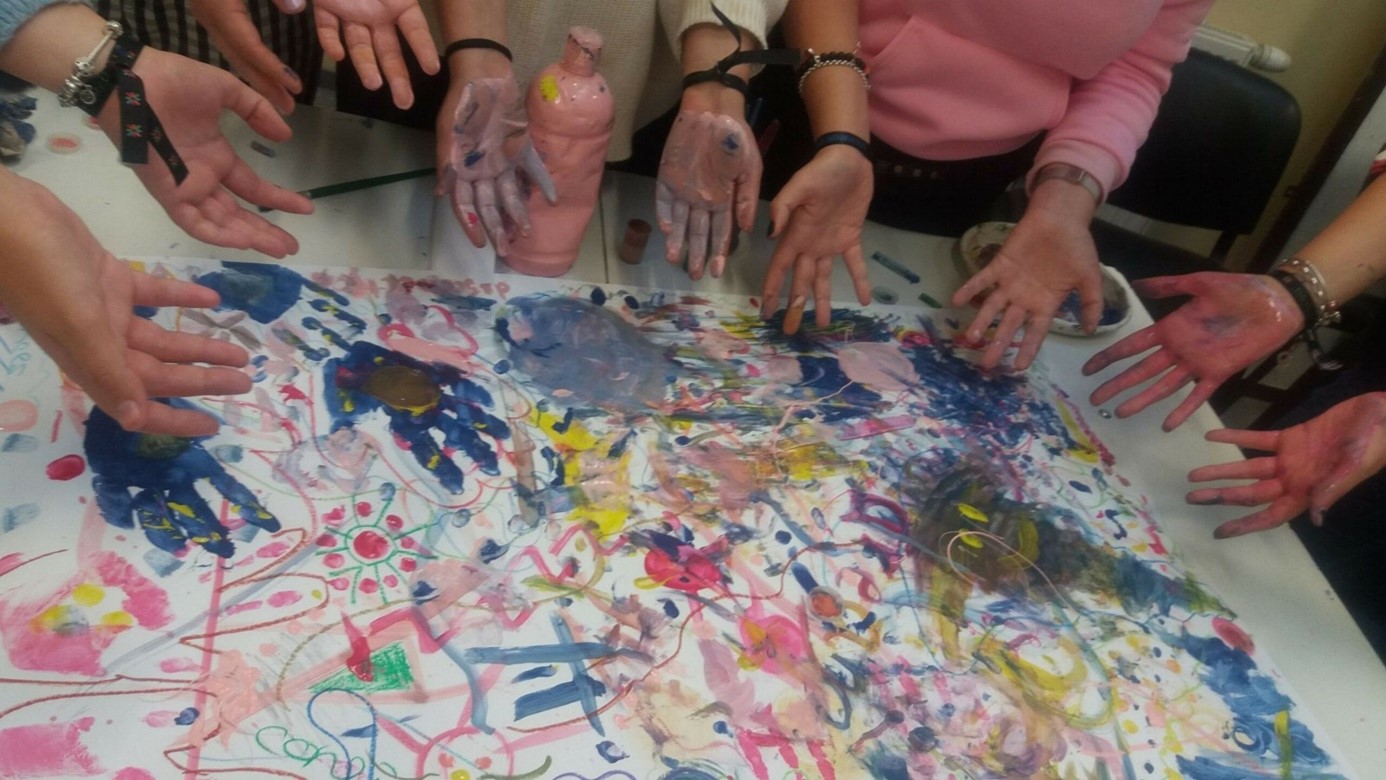
The method of visual and verbal dialogues was created for the purposes of the artistic project realised from 2016 under the name “painting dialogues”. Initially the project anticipated work with artists, yet in the course of time, in my pedagogical practice, I observed that it developmentally, therapeutically and creatively impacted on such groups as: tutors, academic teachers, early education teachers, kindergarten head teachers, children at early education and kindergarten age, and disabled children, working in dialogue with adults, and also marriages.
The method I created consists in joint simultaneous performance of one artistic work. The process takes as much time as the participants need and finishes, when one of the people wishes to complete a given piece of work whilst the other person from the team, allows it. At the time of the work the co-authors draw, talk and get to know one another. The potential of this project demonstrates an interesting stratum of possibilities for mutual communication. It may prompt negotiation of drawing meanings of partners, who have verbal problems with communication. It may be a therapy and form of communication with the external surroundings and significant others. As a dialogue of people belonging to disparate social worlds, it can constitute space of the platform and commonwealth thus being formed.
The method of visual and verbal dialogues draws attention to the possibility of communicating and seeking another language in which there may exist a wider field of interpretation and creation of meanings. Paying attention to the communicative potential of visual and verbal dialogues is important for people who during such work can learn one another. Too frequently the communication of adults tend to be limited, based on the discourse of power and exclusion, or failure to understand one another. In the case of mutual visual and verbal child-parent dialogue, roles become changed. It consists in a simple talk but in search for space for negotiation and learning principles, culture and rules shared by the two participants of dialogue. This is why painting activities in the form of dialogue can be an alternative auto-therapy for their participants. It is not the project that is essential here, but the creative activity itself. Furthermore, this type of activity overcomes language barriers, communicative and social. Role change, but the dialogue between an adult and a child gets to rest on partnership.
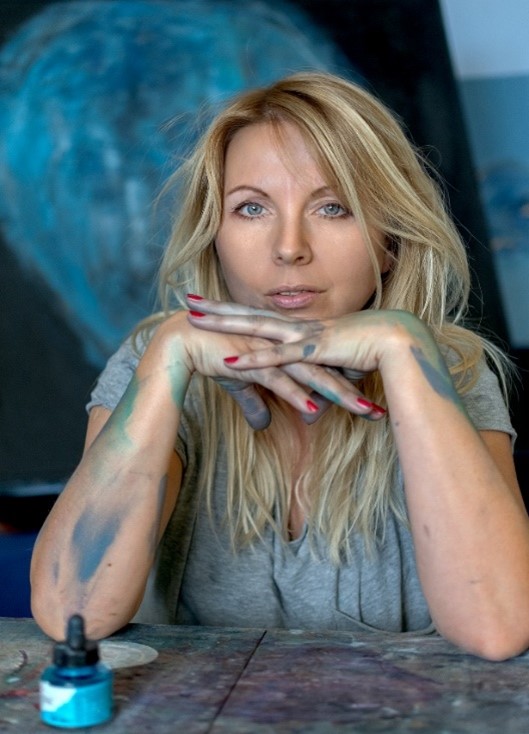 Małgorzata Karczmarzyk, Arpena – a Polish interdisciplinary artist, combining painting, performance and photography with scientific and literary activities. University lecturer, pedagogue, tutor, social activist. Associate professor the University of Gdańsk. In her artistic and research work, she attempts to combine the conceptual apparatus of art and science, proving that these areas are only seemingly diverse and disparate. Their mutual connector is an integrated approach to perception through the heart and thinking. Her artwork and paintwork tend to be dark and surrealistic, which is merely one dimension of her artistic perception. Creating in cooperation with other people, in the original project entitled ‘painters’ ways’, she paints in an energetic way abstract watercolours, which present her artistic dimension in a different context. She defines her own artwork as ‘a path towards self-cognition through the inclination of work with subconsciousness and intuition.
Małgorzata Karczmarzyk, Arpena – a Polish interdisciplinary artist, combining painting, performance and photography with scientific and literary activities. University lecturer, pedagogue, tutor, social activist. Associate professor the University of Gdańsk. In her artistic and research work, she attempts to combine the conceptual apparatus of art and science, proving that these areas are only seemingly diverse and disparate. Their mutual connector is an integrated approach to perception through the heart and thinking. Her artwork and paintwork tend to be dark and surrealistic, which is merely one dimension of her artistic perception. Creating in cooperation with other people, in the original project entitled ‘painters’ ways’, she paints in an energetic way abstract watercolours, which present her artistic dimension in a different context. She defines her own artwork as ‘a path towards self-cognition through the inclination of work with subconsciousness and intuition.
IMPORTANT DATES:
Until 31.07.2023 – recruitment for the course
Until 15.08.2023 – course available online
How to sign up:
Apply via the application form
Summer School – SUSTAINABLE URBAN STUDIES – TOWARDS BETTER URBAN MANAGEMENT

Course completed. See archived information (menu on the right).

The Faculty of Social Science at the University of Gdańsk offers an summer school in English for students on the topic: SUSTAINABLE URBAN STUDIES – TOWARDS BETTER URBAN MANAGEMENT. We credit 4 ECTS points. The course starts on the 3rd of July. The recruitment is now open.
For whom?
- We invite students from abroad with knowledge of English
- The order of application decides the qualification, with priority given to undergraduate students
- Regulamin rekrutacji i udziału w projekcie TOWNSHIP
- Rules of Recruitment and Participation TOWNSHIP
The following documents must be signed and send in scans and in the paper versions to be enrolled:
- Application form
- Personal data form
- Declaration of accession to the Project
- Additional agreement of the participant
- GDPR Statement 1
- GDPR Statement 2
- PROJECT PARTICIPATION AGREEMENT TOWNSHIP – UMOWA O UDZIAŁ W PROJEKCIE TOWNSHIP
Documents should be sent to:
mgr Luiza Maczollek
Instytut Geografii Społeczno-Ekonomicznej i Gospodarki Przestrzennej
Wydział Nauk Społecznych Uniwersytetu Gdańskiego
Jana Bażyńskiego 4
80-309 Gdańsk, Poland
The aim of the summer school is to transfer knowledge and discuss the processes of change that are currently taking place in cities that are facing the necessity of adaptation and transformation as a result of current economic, social, and environmental challenges. During the classes, the processes of social, cultural, infrastructural, landscape and management changes will be discussed.
The requirements to pass the school – participation in at least 80% of the hours of classes (including face-to-face and online classes), submitting a team project, submitting full documentation required for recruitment (as a condition for participation and obtaining a scholarship).
APPLY IN 6 STEPS:
- Register via the form on the website
- Wait for a response from the project office
- Fill in the required documents and send us the scans
- In case of a positive decision – Congratulations! You can start preparing for your journey
- Welcome to Gdansk! Provide original documents and collect your scholarship
- The adventure begins! 5 days of on-site summer school and 5 days of online school await you
Rules of Recruitment and Participation TOWNSHIP
All documents can be found under the MAIN INFO tab
BENEFITS:
- 5 days in the beautiful city of Gdańsk
- 3 days of classes on the UG campus
- 2 field workshops
- Scholarship to co-finance travel and accommodation costs in Gdańsk, approx. EUR 740.
- 5 days of online classes
- Classes with UG lecturers, people from practice, and activists for cities
PAINTING DIALOGUES:
A unique element of our courses are Painting Dialogues and Communication Workshop by Małgorzata Karczmarzyk, ArPeNa.

The method of visual and verbal dialogues was created for the purposes of the artistic project realised from 2016 under the name “painting dialogues”. Initially the project anticipated work with artists, yet in the course of time, in my pedagogical practice, I observed that it developmentally, therapeutically and creatively impacted on such groups as: tutors, academic teachers, early education teachers, kindergarten head teachers, children at early education and kindergarten age, and disabled children, working in dialogue with adults, and also marriages.
The method I created consists in joint simultaneous performance of one artistic work. The process takes as much time as the participants need and finishes, when one of the people wishes to complete a given piece of work whilst the other person from the team, allows it. At the time of the work the co-authors draw, talk and get to know one another. The potential of this project demonstrates an interesting stratum of possibilities for mutual communication. It may prompt negotiation of drawing meanings of partners, who have verbal problems with communication. It may be a therapy and form of communication with the external surroundings and significant others. As a dialogue of people belonging to disparate social worlds, it can constitute space of the platform and commonwealth thus being formed.
The method of visual and verbal dialogues draws attention to the possibility of communicating and seeking another language in which there may exist a wider field of interpretation and creation of meanings. Paying attention to the communicative potential of visual and verbal dialogues is important for people who during such work can learn one another. Too frequently the communication of adults tend to be limited, based on the discourse of power and exclusion, or failure to understand one another. In the case of mutual visual and verbal child-parent dialogue, roles become changed. It consists in a simple talk but in search for space for negotiation and learning principles, culture and rules shared by the two participants of dialogue. This is why painting activities in the form of dialogue can be an alternative auto-therapy for their participants. It is not the project that is essential here, but the creative activity itself. Furthermore, this type of activity overcomes language barriers, communicative and social. Role change, but the dialogue between an adult and a child gets to rest on partnership.
 Małgorzata Karczmarzyk, Arpena – a Polish interdisciplinary artist, combining painting, performance and photography with scientific and literary activities. University lecturer, pedagogue, tutor, social activist. Associate professor the University of Gdańsk. In her artistic and research work, she attempts to combine the conceptual apparatus of art and science, proving that these areas are only seemingly diverse and disparate. Their mutual connector is an integrated approach to perception through the heart and thinking. Her artwork and paintwork tend to be dark and surrealistic, which is merely one dimension of her artistic perception. Creating in cooperation with other people, in the original project entitled ‘painters’ ways’, she paints in an energetic way abstract watercolours, which present her artistic dimension in a different context. She defines her own artwork as ‘a path towards self-cognition through the inclination of work with subconsciousness and intuition.
Małgorzata Karczmarzyk, Arpena – a Polish interdisciplinary artist, combining painting, performance and photography with scientific and literary activities. University lecturer, pedagogue, tutor, social activist. Associate professor the University of Gdańsk. In her artistic and research work, she attempts to combine the conceptual apparatus of art and science, proving that these areas are only seemingly diverse and disparate. Their mutual connector is an integrated approach to perception through the heart and thinking. Her artwork and paintwork tend to be dark and surrealistic, which is merely one dimension of her artistic perception. Creating in cooperation with other people, in the original project entitled ‘painters’ ways’, she paints in an energetic way abstract watercolours, which present her artistic dimension in a different context. She defines her own artwork as ‘a path towards self-cognition through the inclination of work with subconsciousness and intuition.
IMPORTANT DATES:
- 29.05.2023 – 30.06.2023 – recruitment for the summer school
- 3-7.07.2023 – part one of summer school – venue: building of the faculty of Social Science, UG, Gdańsk, Bażyńskiego 4
- 10-14.07. 2023 – part two – online
How to sign up:
Apply via the application form (available from 29.05.2023)
Winter School – SUSTAINABLE URBAN STUDIES – TOWARDS INCLUSIVE URBANITY AND SOCIETY
For whom?
- We invite students from abroad with knowledge of English
- The order of application decides the qualification, with priority given to undergraduate students
- Regulamin rekrutacji i udziału w projekcie TOWNSHIP
- Rules of Recruitment and Participation TOWNSHIP
The following documents must be signed and send in scans and in the paper versions to be enrolled:
- Application form – registration closed
- Personal data form
- Declaration of accession to the Project
- Additional agreement of the participant
- GDPR Statement 1
- GDPR Statement 2
- PROJECT PARTICIPATION AGREEMENT TOWNSHIP – UMOWA O UDZIAŁ W PROJEKCIE TOWNSHIP
Documents should be sent to:
mgr Luiza Maczollek
Instytut Geografii Społeczno-Ekonomicznej i Gospodarki Przestrzennej
Wydział Nauk Społecznych Uniwersytetu Gdańskiego
Jana Bażyńskiego 4,
80-309 Gdańsk, Poland
The aim of the winter school is to transfer knowledge and discuss the processes of change that are currently taking place in cities that are facing the necessity of adaptation and transformation as a result of current economic, social, and environmental challenges. During the classes, the processes of social, cultural, infrastructural, landscape and management changes will be discussed.
The requirements to pass the school – participation in at least 80% of the hours of classes (including face-to-face and online classes), submitting a team project, submitting full documentation required for recruitment (as a condition for participation and obtaining a scholarship)
BENEFITS:
- 5 days in the beautiful city of Gdańsk
- 3 days of classes on the UG campus
- 2 field workshops
- Scholarship to co-finance travel and accommodation costs in Gdańsk, approx. EUR 740.
- 5 days of online classes
- Classes with UG lecturers, people from practice, and activists for cities
PAINTING DIALOGUES:
A unique element of our courses are Painting Dialogues and Communication Workshop by Małgorzata Karczmarzyk, ArPeNa.

The method of visual and verbal dialogues was created for the purposes of the artistic project realised from 2016 under the name “painting dialogues”. Initially the project anticipated work with artists, yet in the course of time, in my pedagogical practice, I observed that it developmentally, therapeutically and creatively impacted on such groups as: tutors, academic teachers, early education teachers, kindergarten head teachers, children at early education and kindergarten age, and disabled children, working in dialogue with adults, and also marriages.
The method I created consists in joint simultaneous performance of one artistic work. The process takes as much time as the participants need and finishes, when one of the people wishes to complete a given piece of work whilst the other person from the team, allows it. At the time of the work the co-authors draw, talk and get to know one another. The potential of this project demonstrates an interesting stratum of possibilities for mutual communication. It may prompt negotiation of drawing meanings of partners, who have verbal problems with communication. It may be a therapy and form of communication with the external surroundings and significant others. As a dialogue of people belonging to disparate social worlds, it can constitute space of the platform and commonwealth thus being formed.
The method of visual and verbal dialogues draws attention to the possibility of communicating and seeking another language in which there may exist a wider field of interpretation and creation of meanings. Paying attention to the communicative potential of visual and verbal dialogues is important for people who during such work can learn one another. Too frequently the communication of adults tend to be limited, based on the discourse of power and exclusion, or failure to understand one another. In the case of mutual visual and verbal child-parent dialogue, roles become changed. It consists in a simple talk but in search for space for negotiation and learning principles, culture and rules shared by the two participants of dialogue. This is why painting activities in the form of dialogue can be an alternative auto-therapy for their participants. It is not the project that is essential here, but the creative activity itself. Furthermore, this type of activity overcomes language barriers, communicative and social. Role change, but the dialogue between an adult and a child gets to rest on partnership.
 Małgorzata Karczmarzyk, Arpena – a Polish interdisciplinary artist, combining painting, performance and photography with scientific and literary activities. University lecturer, pedagogue, tutor, social activist. Associate professor the University of Gdańsk. In her artistic and research work, she attempts to combine the conceptual apparatus of art and science, proving that these areas are only seemingly diverse and disparate. Their mutual connector is an integrated approach to perception through the heart and thinking. Her artwork and paintwork tend to be dark and surrealistic, which is merely one dimension of her artistic perception. Creating in cooperation with other people, in the original project entitled ‘painters’ ways’, she paints in an energetic way abstract watercolours, which present her artistic dimension in a different context. She defines her own artwork as ‘a path towards self-cognition through the inclination of work with subconsciousness and intuition.
Małgorzata Karczmarzyk, Arpena – a Polish interdisciplinary artist, combining painting, performance and photography with scientific and literary activities. University lecturer, pedagogue, tutor, social activist. Associate professor the University of Gdańsk. In her artistic and research work, she attempts to combine the conceptual apparatus of art and science, proving that these areas are only seemingly diverse and disparate. Their mutual connector is an integrated approach to perception through the heart and thinking. Her artwork and paintwork tend to be dark and surrealistic, which is merely one dimension of her artistic perception. Creating in cooperation with other people, in the original project entitled ‘painters’ ways’, she paints in an energetic way abstract watercolours, which present her artistic dimension in a different context. She defines her own artwork as ‘a path towards self-cognition through the inclination of work with subconsciousness and intuition.
IMPORTANT DATES:
16.01.23.- 12.02.2023 – recruitment for the winter school
27.02 – 10.03.2023 – winter school
How to sign up:
Apply via the application form (available from 09.01.2023)
Report:
Painting dialogues, excursions around the Tricity, teamwork workshops, activities – the TOWNSHIP winter school has just finished at the University of Gdansk. As part of the project, 12 students and doctoral students from Estonia, Ukraine, Germany, Turkey, the Czech Republic and Hungary came to Gdansk. The project is funded by the SPINAKER Programme – Intensive International Training Programmes of the National Agency for Academic Exchange.
The winter school ‘Sustainable urban studies – towards inclusive urbanity and sociality’ within the project “TOWNSHIP – Towards Sustainable Beautiful and Inclusive Cities: intensive international education programmes” has come to an end. Twelve participants, students and doctoral students from European universities abroad, took part from 27th February to 10th March.
“The aim of the TOWNSHIP project is to promote Gdańsk and the University of Gdańsk as a place where you can study in English. Therefore, this offer is primarily aimed at international students. The aim of the winter school was to familiarise the participants with the research topics, the staff and the campus of the University of Gdańsk” says Grażyna Chaberek, PhD, from the Faculty of Social Sciences at UG, the project manager.
The school programme was divided into two parts. In the first week there were on-site classes and in the following week there were remote classes. The workshop part took place in the Faculty of Social Sciences, at the premises of the Centre for Sustainable Development.
“As part of CZRUG’s programmes, such as ‘International Cooperation’ and ‘Education for Sustainable Development’, we are constantly involved in and support initiatives aimed at popularising the idea of sustainable development. For one week, we had the pleasure of hosting students and doctoral students within our walls as part of a winter school. They managed to form a truly international and interdisciplinary group, which eagerly engaged in workshops and discussions” says Krzysztof Szczepaniak, PhD, Director of the Centre for Sustainable Development UG.
The thematic theme of the winter school was to discuss the processes of change currently taking place in cities, which are facing the need to adapt and transform as a result of current economic, social and environmental challenges. During the course, processes of social, cultural, infrastructural, landscape and governance change were discussed through meetings with both academics and didacticians working on these topics at the University as well as with representatives of stakeholders from the external environment.
“Students have acquired the ability to characterise sustainable development goals in the context of urban areas, to identify climatic, social and economic problems of contemporary cities. They are familiar with European urban policies. In the final project, which they prepared in groups of 3-4, they proposed solutions to the problems of contemporary cities using selected locations as an example. The participants were able to practice discussion and communication in an interdisciplinary and intercultural team” emphasises Grażyna Chaberek, PhD.
The students also had the opportunity to develop their artistic sensitivity. A unique element of the winter school was the painting dialogues with Małgorzata Karczkarzyk, PhD. As the artist and researcher from the Institute of Pedagogy emphasises, the opportunity to paint the work together helps to bring communication between the participants to a higher level:
“It is a search for a different language. Verbal language is not neutral, there are certain patterns, certain rules, behaviours, while in a dialogue in painting you can do anything, there is total freedom, expression and entering a space open to exclusions, to differences. This is why painting dialogues can also be used in intercultural education” explains Małgorzata Karczmarzyk, PhD.
In addition to the classes and activities within the walls of the university, the TOWNSHIP participants also set off to explore the urban areas.
“During the two excursions, students had the opportunity to experience the Tricity directly, including learning about the landscapes, infrastructure, social and historical conditions affecting urban space. In their free time, participants also visited the UG campus in search of interesting nooks and crannies, explored the old city, and took part in a tour of the exhibition at the European Solidarity Centre” reports Weronika Kamińska, MA, from the Centre for Sustainable Development, a PhD student and supervisor of the winter school participants.
The Winter School was positively reviewed by both the international students and the University of Gdansk staff who participated in the project.
– Our participants completed the winter school very satisfied with both the content that was covered and their stay in Gdansk itself. They thus became ambassadors for our university in their respective countries. Our staff, who had the opportunity to work with this very diverse nationality group of students, also improved their competences in working with foreign students” notes Grażyna Chaberek, PhD.
The project “TOWNSHIP – Towards Sustainable Beautiful and Inclusive Cities”, headed by Grażyna Chaberek, PhD, from the Faculty of Social Sciences at UG, has received funding from the SPINAKER Programme – Intensive International Education Programmes of the National Agency for Academic Exchange.
The project will result in a total of three Intensive International Training Programmes (IMPK):
- Massive Open On-line Course: tools towards sustainable urbanity,
- Winter school: Sustainable urban studies – towards inclusive urbanity and society,
- Summer school: Sustainable urban studies – towards better urban management.
The project has been developed with the support of the UG Centre for Sustainable Development. It will be implemented by a team from the Faculty of Social Sciences, including primarily the Institute of Social and Economic Geography and Spatial Economy and the UG Centre for Sustainable Development, in collaboration with external stakeholders, including local public institutions and NGOs.
Project co-financed from European Funds

